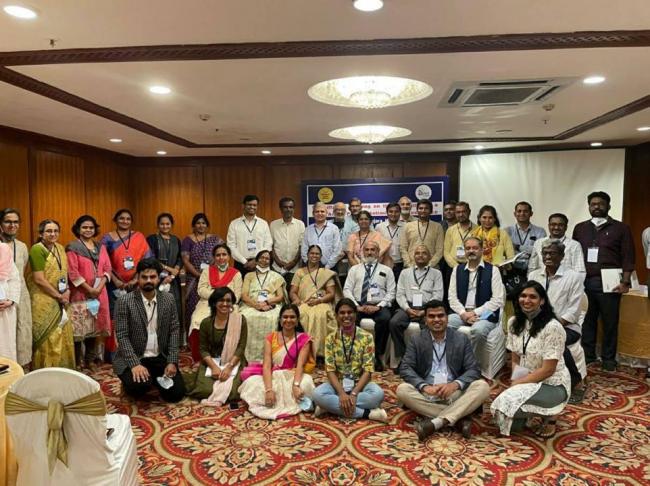Health Experts Call For A State Action Plan On Antimicrobial Resistance In Telangana

Over 50 healthcare experts gathered in Hyderabad.
Submitted a recommendation to prioritise the issue of AMR in the state of Telangana, which is affecting the health sector and health systems.
Call for Telangana state action plan ASAP
Three states - Kerala, Madhya Pradesh, and Delhi - have come up with their action plans.
Hyderabad: Experts from the health, veterinary, agriculture, pollution control, and environmental sectors called on the government of Telangana to start the process of framing an action plan to contain the threat of antimicrobial resistance (AMR) in the state. Over 50 experts gathered in Hyderabad today to discuss the possible impact of AMR on healthcare and how it could adversely affect the health systems in the state. The meeting was organised by ReAct Asia Pacific, an international science-based network working on the AMR issue, and Superheroes against Superbugs, which is an AMR advocacy group operating in the city of Hyderabad.
AMR has been acknowledged as one of the most important healthcare issues of the twenty-first century, and it has often been referred to as a silent pandemic. With 700,000 recorded deaths due to AMR each year, the World Health Organisation declared it as one of the top 10 global public health threats facing humanity. According to a 2017 World Bank report, if nothing is done, the death toll could rise to 10 million per year by 2050, resulting in a 3.8 per cent reduction in annual GDP. This issue increases morbidity and mortality due to infectious diseases and drives up the cost of healthcare expenditure. Besides, it has the power to saturate the scarce healthcare facilities and reduce trust in the formal healthcare system. AMR disproportionately affects low-middle income countries when compared to high-income countries. The United Nations had previously called for concerted global action to contain it.
The speakers at the event included prominent subject experts like Dr T Gangadhar, Technical Adviser to the Government of Telangana, Dr Anuj Sharma, Technical Officer at the World Health Organization’s country office for India, Dr Dilip Mathai, Dean of Apollo Institute of Medical Sciences & Research, Dr Ranga Reddy, President of Infection Control Academy of India, Dr Vijay Yeldandi, Director, SHARE, India, Dr Radha Rangarajan, Co-founder of Vitas Pharma, Dr GV Ramanjanayelu, Founder, Centre for Sustainable Agriculture and Dr Mekala Lakshman from PV Narasimha Rao Telangana Veterinary University. All the participants and speakers agreed that we need to have a strategy to tackle this issue at the state level and efforts should be taken to complement the National Action plan on AMR.
The National Action Plan for AMR was launched in 2017 by the Government of India. Subsequently, three states - Kerala, Madhya Pradesh, and Delhi - have come up with their action plans. Several other states are at various stages of drafting their action plans on AMR. Since AMR is primarily driven by antimicrobial misuse in sectors like health, agriculture and animal husbandry, it is pertinent that the state governments are fully involved in the action to contain this issue.
The meeting called on the Government of Telangana to consider:
- prevention and control of infectious diseases, both in communities and in healthcare settings for humans and animals,
- education and capacity building of medical professionals and chemists, in addition
- surveillance and sharing of local antibiotic resistance patterns in the state.
In addition, the group also emphasised community engagement while building policies to tackle AMR.
Dr T Gangadhar, Technical Adviser to the Government of Telangana and Professor at NIMS, said, "Antibiotic misuse, lack of clean water and sanitation, and inadequate infection prevention and control are the major drivers of AMR in Telangana. There needs to be a multisectoral plan to contain AMR in the state." He suggested that some of the mechanisms already put in place for COVID response by the state government could be utilised for AMR surveillance. "Telangana diagnostic hubs have been created in each district with all the necessary microbiology services, which can be utilised to monitor AMR at the district level by putting in place a state level nodal centre for data collection and reporting."
Dr Krishna Reddy, Director of Access Health India, added, "TS Diagnostics is on top of the government agenda. AMR surveillance data can be integrated into TS Diagnostics. Similarly, the Commissioner of Health and Family Welfare, Telangana is focusing on improving the safety and quality of public hospitals. Having Quality of Care on the health policy agenda is the first step to bringing AMR into consideration."
Dr Anuj Sharma, Technical Office (AMR, Infection Prevention Control & Labs) at the WHO Country Office for India, emphasised the One Health approach to fighting the problem. It requires concerted efforts in human health, animal health, the environment, and the food sectors to minimise irrational antibiotic use. He said, "The state governments have to show an active interest in containing the problem at local levels. It is also very important that the different people working on the ground both in human and animal health sectors should routinely share data on AMR to address the issue at large".




